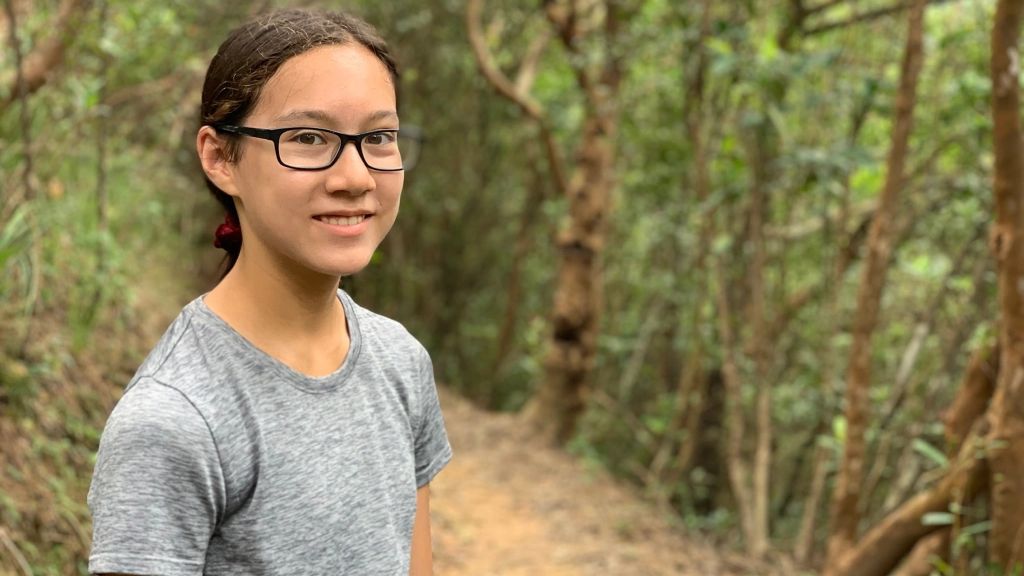Girl who took own life moved to UK 'because of Harry Potter'

Buckinghamshire Coroner's Court recorded suicide as Caitlyn's cause of death.
- Published
The father of a girl with autism who took her own life said Harry Potter inspired her to move from the family home in Singapore to a UK boarding school.
Caitlyn Scott-Lee, 16, attended Wycombe Abbey school in Buckinghamshire from the age of 11, where she lived onsite.
Her father, Jonathan Scott-Lee, said it was Caitlyn’s choice to attend the boarding school.
He said: “She was into Harry Potter at the time, and it was Caitlyn who chose Wycombe Abbey."
Jonathan Scott-Lee said his daughter "loved learning".
He added: "She loved learning, even in the Singapore system - which is very competitive - she was one of the top one or two in her class.
“She would say ‘tell me more stuff Daddy, I’m like a sponge’. She had an intense desire to please those in authority.”
Caitlyn died on 21 April 2023, just weeks before she was due to sit her GCSEs. She had been diagnosed with autism the year before.
She had sought help from the NHS just weeks before her death and killed herself because she could not bear the thought of a detention, an inquest heard.
Her father recalled: “We increasingly heard less and less from her, not because she didn’t want to speak to us, but because she was having so much fun with the new friends she had made…and she really enjoyed that boarding school life.”
Jonathan Scott-Lee said his daughter's detention would have "disproportionately weighed on her mind"
In Year 11, Caitlyn received a detention for having alcohol in her locker and missed a concert, just before the Easter holidays.
Her father, who is himself autistic, said that she became preoccupied by the detention.
He told the BBC: “It was probably appropriate that she had a sanction for that but, for someone like Caitlyn, I can imagine that it might have disproportionately weighed on her mind during that long Easter period.”
In a statement read out in court, her mother Tara said that during the Easter holidays, Caitlyn had asked to see a GP for anxiety, which her mother arranged.
She was given a referral to the NHS Child and Adolescent Mental Health Services, booked for the 16 May. But Caitlyn took her own life just hours before the detention was due to begin.
Caitlyn Scott-Lee boarded at Wycombe Abbey School from the age of 11
During the inquest, an excerpt from Caitlyn’s personal diary was read out, where she acknowledged that she might be self-medicating with alcohol.
“I’ve been feeling suicidal” she wrote.
She texted a friend during the school holidays and said: “I’m the most anxious and depressed I’ve ever been. I’d rather be suspended than have a detention.”
The inquest heard from the headmistress of Wycombe Abbey, Joanne Duncan.
She said: “The school has been devastated by Caitlyn’s death. She was a much-loved pupil who was celebrated for her talent in performing arts.”
The school had not been aware that she had been suffering from anxiety during the school holidays, nor was she on the list of girls with "serious mental health issues".
Ms Duncan added: “We are deeply saddened that we were unaware of the difficulties she was suffering with.”
Increased risk
Nearly one in four people with autism have attempted suicide and were seven times more likely to die by suicide than non-autistic people, charity Autism Centre of Excellence at Cambridge, said.
In an open letter to the government, it highlighted the increased risk.
Its CEO, Tom Purser, said: “Caitlyn’s inquest has demonstrated that despite schools and the NHS doing their best, it is too frequently not enough to prevent the most tragic of outcomes."
He added: "The government must listen, both to the people signing our letter and to the countless stories like Caitlyn’s which send a loud and clear message - work with us and help save autistic peoples' lives.”
'Caitlyn loved intensely'
The charity Autistica said that while only 1% of the UK population are autistic, 15% of people who attempted suicide have a diagnosis of autism.
Mr Scott-Lee told the inquest: “It’s a myth that people with autism don’t have much emotion - we do but it’s amplified and internal.
"We are often misunderstood. Caitlyn loved intensely but also internally.
“Caitlyn would not have wanted to unleash such emotional devastation on her loved ones. Most people don’t want to end their lives, they just want the pain to stop.”
The bereaved father wondered if his daughter's autism was "appropriately considered in the context of Caitlyn’s actions".
The inquest concluded there was "no evidence" that anything would have helped the school prevent the 16-year-old from taking her own life.
However, her father wondered whether his daughter's "narrative" was "fully heard".
Mr Scott-Lee said: "The big hole in this inquest is Caitlyn’s diary. It is a very, very unusual inquest.
"The coroner is right. Caitlyn left a uniquely comprehensive five-year account of her life. However, I wonder whether her narrative was fully heard. I still wonder whether autism was appropriately considered in the context of Caitlyn’s actions.
"To honour Caitlyn and support the broader autistic community, it is right to reflect on whether there has been appropriate diligence in this investigation. I will consider options and revert in due course."
If you've been affected by the issues in this story, help and support is available via the BBC Action Line
Follow East of England news on Facebook, external, Instagram, external and X, external. Got a story? Email eastofenglandnews@bbc.co.uk, external or WhatsApp us on 0800 169 1830
Related Topics
Related Internet Links
Around the BBC
- Published1 May
- Published20 April